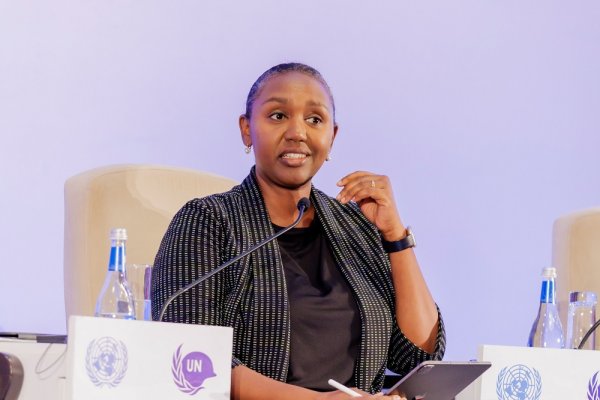The debate over “sportswashing” has found its way into Rwanda’s growing presence on the global sports stage. The term, often used to criticize nations accused of leveraging sports to mask societal flaws, has been wielded against Rwanda with increasing frequency. But Rwandans, including spokesperson Yolande Makolo, are pushing back, asserting that such claims undermine Rwanda’s legitimate strides in economic and social development.
The conversation recently flared up on X (formerly Twitter), where journalist Jackie Lumbasi posed a thought-provoking question:
“I see ‘sportswashing’ everywhere I look. What on earth is ‘sportswashing?’ In the spirit of leaving no one behind, please tell me in Kiswahili or Kinyarwanda. I want to learn.”
In a direct response, Makolo dismissed the term as a weapon used by critics to downplay Rwanda’s progress. Her reply was pointed:
“These people who came up with the word ‘sportswashing’ are a cabal in a swim against the tide. They want all the profits from the sports business to stay in the preserve of those few rich countries that have historically reaped the benefits. But now we are in 2024. Things have moved further steps. Let’s go!”
A Closer Look at “Sportswashing”
“Sportswashing” refers to the use of sports to distract from or obscure unethical practices, including human rights violations, corruption, or authoritarianism. While some accuse Rwanda of engaging in such tactics, the government has firmly rejected this label, asserting that its investments in sports are part of a broader strategy to drive economic growth and foster unity.
Makolo’s remarks echo sentiments she shared in a July op-ed for The New Times, titled “Sports-washing Brigade Swimming Against the Tide.” In the article, she clarified Rwanda’s sports initiatives as vehicles for transformation, not deflection. She also took aim at detractors who, she pointed out, aim to diminish Africa’s achievements in global sports.

Building Momentum Through Sports
One of Rwanda’s most celebrated partnerships, the Visit Rwanda tourism campaign, exemplifies this vision. Collaborations with international football clubs like Arsenal FC, Paris Saint-Germain, and FC Bayern Munich helped generate a staggering $620 million in 2023—a 36% increase from the previous year. This initiative underscores the country’s shift from being a consumer of sports to a major player in the global sports economy.
Makolo also highlighted how sports initiatives like the nationwide “Car-Free Day” foster unity and physical wellness, showcasing how Rwanda integrates sports into everyday life to promote community well-being. Globally, this approach aligns with the UN’s recognition of sports as a tool for development and peace.
A Year of Sporting Excellence
In 2024, Rwanda hosted an impressive lineup of events, reinforcing its reputation as a hub for international sports. From the Tour du Rwanda and the Kigali International Marathon to the Basketball Africa League (BAL) Finals and the Ironman 70.3 triathlon, Rwanda attracted athletes and fans from around the world.

Other notable events included the African Gymnastics Championships, the ATP Challenger 50 Tour, and high-profile tennis tournaments like the Billie Jean King Cup and the Davis Cup. As the country gears up to host the 2025 World Cycling Championship, it is also advancing its bid to bring Formula 1 back to Africa for the first time since 1993.
President Paul Kagame formally announced Rwanda’s Formula 1 bid during the Federation Internationale de l’Automobile (FIA) General Assembly in Kigali on December 13. Speaking with characteristic optimism, Kagame said, “I assure you that we are approaching this opportunity with the seriousness and commitment which it deserves. Together we will build something we can all be proud of.”
Facing the Critics
Despite these achievements, critics have targeted Rwanda, accusing it of using sports to distract from broader issues. Makolo, however, sees this narrative as a double standard, one designed to keep African nations from claiming their rightful place in the global sports economy. She pointed to South Sudan’s historic qualification for the 2024 Paris Olympics as an example of how African sports are making strides, despite detractors’ efforts to undermine them.
Rwanda’s growing prominence in sports is more than a business strategy—it’s a testament to the nation’s resilience and ambition. While the term “sportswashing” may linger in headlines, Rwanda remains focused on harnessing the power of sports to foster unity, generate economic growth, and inspire a continent.

